
Spoiler Warning: This retrospective will be discussing specific plot points from the five original Planet of the Apes films.
The Planet of the Apes
franchise is one of the most audacious, bizarre, bold and bleak film series of
the 20th century. Released between 1968 and 1973 the original five
films took an allegorical look at the social and political issues that America confronted
during this time, such as racism, war, and the fear of nuclear war. As opposed to the James Bond franchise, Planet of the Apes
wasn’t merely escapism. They were high
entertainment that also presented its audience with cautionary tales about the future of civilization.
The idea of a planet on which apes
were the dominant species and humans the primitive creatures sprang from the
imagination of French novelist Pierre Boulle.
Boulle had previously written the novel The
Bridge on the River Kwai, which became the Oscar winning film from David
Lean in 1957. Boulle wrote Planet of the Apes in 1963. The novel-while somewhat overshadowed by the film franchise-
is a brilliant piece of science fiction that should be read by all fans of the
genre. It's narrated by Ulysse Merou,
a journalist who takes part in a space journey with Professor Antelle and a
physician named Arthur Levain. They land on a planet much like earth, which
they name Soror. They realize the planet is dominated by intelligent apes who
enslave humans. Levain is killed and Antelle becomes animal-like while locked
in a zoo. Unlike the other humans on the planet Ulysse can speak. He shacks up with a
woman named Nova and becomes friends with Zira, an animal psychologist, and her
archeologist finance, Cornelius.
In 1968 a film version of Boulle's novel was released. And after nearly 50 years Planet of the Apes is still the definitive film of this franchise. The film stars Charlton Heston as George Taylor, an astronaut
on an unspecified mission with three others: two men- Dodge and Landon (Jeff Burton and Robert Gunner), and a
woman named Stewart (Dianne Stanley, un-credited). The film opens with
Taylor recording a message in which he says their ship is
travelling at the speed of light. Even though they have been away from the
Earth for only several months (their time) the Earth has aged hundreds of
years.
Taylor goes in to hibernation with the rest of the crew and
after the title sequence the ship crashes on an unknown planet. The three men
discover there was an air leak in Stewart’s tube, which killed her. The three remaining
astronauts eventually happen upon primitive humans who cannot speak. Gorillas come along and begin hunting
the humans. Dodge is killed but Taylor and Landon are captured. Taylor is shot
in the throat so he can’t speak. Thus the apes believe Taylor is just
another dumb human. As in the novel Zira and Cornelius (Kim Hunter and Roddy
McDowall) become his allies. When Taylor regains his ability to speak he utters
one of the film’s most iconic lines, “Get your stinking paws off me, you damn
dirty ape!”
A tribunal is held to discover why Taylor can talk. It’s in
these scenes that the film explores the conflict between faith and science. The
orangutans believe that its scientific heresy for Zira and Cornelius to claim
that Taylor is a missing link in the evolutionary change. Dr. Zaius (Maurice Evans)- an
orangutan and the film’s chief antagonist- holds two contradictory positions.
He’s both Minister of Science and Chief Defender of the Faith. Near the end of the film Taylor says Zaius's position as Defender of the Faith interferes with his obligations towards the progression of science. Zaius responds by
saying: “There is no contradiction between faith and science...true science.”
Zaius can’t or won't acknowledge the
conflict in his duties. Zaius knows that man used to rule the planet but believes
it’s best to keep the true history of the planet a secret from ape society. He even
goes as far as destroy Cornelius’ archeological dig, which contained evidence
of an earlier non-ape civilization. Zaius is a great antagonist because his
motivations and philosophy make complete sense and we can the situation from his point of view. He feels he’s acting in the best interests of his species. He’s not a
noble character but he does have- in his mind at least- noble intentions.
In the closing moments of the film Taylor-on horseback with
Nova (Linda Harrison)- discovers the ruins of the statue of liberty on the shore. It turns out
this "alien" planet was Earth all along. The final shot of the film is one
cinema’s most indelible images and of the greatest closing shots of all
time. It’s an image that represents the
downfall of civilization-in particular American civilization- the fear of
nuclear destruction and the how remnants of the past are always present.
The ending of the film also relates to Taylor's character arc. At the beginning of the film Taylor says
he has no regrets upon leaving the 20th century and mocks Landon for
having any affinity for humanity. By the end Taylor has regained some
appreciation for humanity. He tells Zaius that whoever was here before the apes
was “better than you.” When he sees the statue we see a man who's hatred of humanity is arguably validated. The ending also shows that Taylor cared enough about humanity that it's self destruction deeply anguishes him.
What’s also notable about the use of this image is it represents the cultural difference between Boulle’s novel and the film
series. While the novel was written through a French perspective the film was
directed and written by Americans. The statue of liberty is a thoroughly
American image and it’s placement at the end of the film speaks to the fall of America
even as it also represents the downfall of civilization at large. Rod Serling
was already famous for his TV series The Twilight Zone, which tackled social issues on a weekly basis through the prism of science fiction and fantasy. Serling co-wrote
the screenplay for Planet of the Apes with Michael Wilson and suggested the now famous ending. In Boulle’s novel the planet
is not earth. The novel ends with Ulysse, Nova and their son travelling back to
Earth only to discover that it’s also become a planet of the apes. The seed of
the film’s ending is there but Serling expanded upon the ending. The film's twist ending defined the
entire mythology on here onwards. It’s strange now to think of the planet being anything else
but Earth. It’s a perfect thematic resolution and brings home all the social
commentary of the story. The upside down civilization isn’t just a mirror
version of our society but the result of man’s self-destruction.
While the Planet of
the Apes films aren’t usually thought of as directors’ film, Franklin J. Schaffner’s
work here can’t be overlooked. Schaffner invokes and sustains a mood of surreal
and nightmarish dread. He makes us feel we’re on a completely “alien world.” Schaffner’s
direction captures Boulle’s absurd vision. Jerry Goldsmith’s score also adds to the tension and
atmosphere of the film. His score matches the primitive nature of the world.
While Planet of the
Apes was never designed to be an ongoing series the success and popularity
of the film led to a sequel two years later. Beneath the Planet of the Apes (1971) is one of the most gonzo and
audacious sequels I’ve ever seen. Its ending alone may be the greatest example
of franchise self-sabotage in film history. However, the film suffers early on
from feeling like the original film in miniature. Heston only agreed to appear
at the beginning of the film (in which he disappears) and then reappear at the
end only to be killed off. Thus the filmmakers had to introduce another leading
character and actor.
TV actor James Franciscus was cast as Brent, another
astronaut who was sent to find Taylor’s ship. Like Taylor Brent lands on future
earth. He meets up with Nova, Cornelius and Zira. Then along with Nova searches
for Taylor. The early parts of the film do feel like we’re going over familiar
ground, with the added wrinkle of looming war as General Ursus (James Gregory) rallies gorillas
behind his mission to enter the Forbidden Zone. Franciscus is solid in his role but he can't help but feel like George Lazenby to Heston's Sean Connery. It's too apparent the filmmakers were attempting to "replace" Heston but I feel a different kind of human lead than just another all American astronaut would've made things fresher. Ted Post took over directing duties from Schaffner and does a serviceable job. His direction doesn't feel too inconsistent with Schaffner's and he keeps the pace rolling along smoothly.
The film becomes more its own animal when Brent and Nova’s
search leads them underground. There they discover mutated humans with telekinetic powers worship
a nuclear bomb capable of destroying the entire planet. Brent and Nova become
the mutants’ captives and we learn Taylor is also imprisoned. The mutants don’t exist in Boulle’s novel but are a creation of the script by Paul Dehn. Their society is a startling new piece of the
planet’s mythology. This aspect of the world that was suggested
in the first film. Its theorized that Taylor is a mutant. This idea comes to full
terrifying light in this film. These mutants are a twisted and
perverse representation of how the world’s destruction has changed humanity.
Moreover, the worshipping of a bomb as some kind of God is a satirical jab at
religion. It's also a play on idea that humanity invented God and not the other way around.
If this bomb is the mutant’s God it’s not a benevolent God but a violent
and angry one.
The film also comments on the Vietnam War. There are
chimpanzee protestors who are against the war, representing the negativity
towards the conflict in Vietnam and the generation gap between the powers that
be and the younger generation who wanted love, not war. Ultimately, It’s war that brings
about the world’s complete destruction. After escaping, Taylor attempts to stop
the bomb from going off but is shot by Ursus. Taylor confronts Zaius for the last
time and asks for help. Zaius blames humanity for all the destruction in the
world. Taylor witnessed Nova being shot by a gorilla. Nova was all Taylor had left and his final act is to activate the
bomb, obliterating the earth. I think
the film is saying that history not only repeats itself but repeats
itself to an even greater degree. Human civilization as we know it has already
been destroyed due to human war but now the entire world, including apes, will
cease to exist due to the gorilla war. But it’s a human that sets
off the bomb, which may validate Zaius’ fear of humankind.
Beneath the Planet of
the Apes’ ending is incredibly bleak and it’s remarkable that the
filmmakers got away with it. It’s hard to imagine a major studio today would
allow a major franchise film to eliminate the possibility
for more sequels. But while this ending appeared to end the franchise for good,
the studio demanded another sequel. In a strange twist of fate destroying the
world forced the filmmakers to be creative in how they would continue on the
franchise and expand upon the mythology.
In Escape From the
Planet of the Apes (1971) we learn a chimpanzee scientist named Dr. Milo (Sal Mineo) was
able to repair Taylor’s sunken ship. He, Cornelius and Zira escaped from the
planet before it exploded and travelled back in time to 1970s San Francisco.
This was an ingenious way for the series to continue and find a fresh
context in which to tell another story, despite it being a stretch that Milo
could fix Taylor’s ship. By bringing apes to present day Earth the film
reverses the dynamic of the previous films. The apes are now the outsiders.
While Cornelius and Zira (Milo is killed by a gorilla when the
three of them are first put in a zoo) are first treated as celebrities and the
film functions as a light comedy, the film takes a darker turn when it becomes
more apparent that the apes will eventually cause
the world to be destroyed. Dr. Otto Hasslein (Eric Braeden) wants the apes- including Zira’s unborn baby- to
be killed. (Hasslein is the scientist whose theory on light speed travel Taylor mentions in the first film.) The apes have allies in Drs. Lewis Dixon (Bradford Dillman) and Stephanie Branton (Natalie Trudy),
along with Armando (Ricardo Montalban), a circus owner. But tragically Hasslein
kills both Zira and Cornelius- after Cornelius fatally wounds Hasslein- at the
film’s conclusion. Hasslein also kills what he believes to be Zira’s child,
which is actually another baby ape. Zira’s real child is with Armando.
Director Don Taylor does an admirable job at balancing the
light and dark elements of the film’s script (written by Dehn once again). The emotional journey on which the audience goes along with the
characters feels tonally cohesive and not too jarring. McDowall wasn’t able to come back for Beneath so the role was recast with David Watson but thankfully he
was able to reprise his role as Cornelius here. He and Kim Hunter are really the heart of
this franchise and it’s devastating to watch them die- especially since we’ve grown close to the characters for two prior films.
Escape is a very philosophical film, particularly when it comes to the ethics of murder. Hasslein asks if we'd kill Hitler when he was a baby or his mother when he was pregnant. Is murder justifiable if it can stop horrible things from happening. The harsh irony in this film is
that Hasslein believes murdering Cornelius and Zira will save the future. The truth is the opposite. Cornelius recounts how poorly apes were treated by
humans and this cruelty led to the ape uprising. It’s only through love and
respect that the future can be saved. I presume the film is attempting to
say that even a man of science can be driven to violence but I feel Hasslein
too easily slips in to the role of murderer. There needed to be more development for that particular shift.
The final shot of the film, with little baby Milo saying his
first word over and over- “Mama” is haunting and a perfect finish to this film. Beneath’s ending was very close
ended- Escape’s clearly sets the
stage for another sequel.
That sequel would be Conquest
of the Planet of the Apes (1972). I feel this may be the best of the four
sequels. Emotionally it’s the most powerful of the five films- as well
as least “fun” of the series. While Escape had its share of lighthearted
moments Conquest is consistently unpleasant. This is an angry film and
continues the perspective shift found in Escape.
It’s no longer the humans are the victimized. We finally see the cruelty and
injustice that led to the apes taking over. The film picks up in 1991, 8 years
after a plague wiped out all cats and dogs. Humans have taken on highly evolved
apes as pets- and essentially slaves. America has also become a police state.
Milo (now going by Caesar) is now a teenager and is still in the care of
Armando. Caesar has to pretend he can't speak so he won't be discovered as Cornelius and Zira's child. Montalban does subtly look older and a little more world-weary, which
I like. While in the city Caesar curses a police officer who is abusing an ape. Armando attempts
to take the blame so Caesar is not discovered. Armando
is taken in to custody and Caesar becomes a slave. Armando dies after
attempting to escape an interrogation, spurring Caesar to lead a rebellion
against humanity.
J. Lee Thompson, the director of the original Cape Fear (1962), was
brought in for this installment. Thompson creates a harsh atmosphere and a
gritty aesthetic to the film, and stages the rebellion scenes with a brutal
bluntness and lack of glamour.
Cornelius died in the previous film but Roddy McDowall
returned to play his former character’s son. What’s remarkable about McDowall’s
performance is Caesar feels like a totally different character than
Cornelius. Caesar is a much angrier, rawer and impetuous character than
Cornelius. Through makeup McDowall crafts a performance that makes us feel both
empathy and terror. It’s a tremendous performance that solidifies McDowall as
the signature actor of this series. We understand Caesar’s motives and the film
makes us angry along with him. The humans in this film aren’t the primitive
savages of the first film but they’re savages nonetheless. They've learned nothing from Cornelius and Zira's arrival- that the mistreatment of apes will be humanity's downfall.
There’s another sympathetic character named MacDonald (Hari
Rhodes), the aid to the cruel Governor Breck (Don Murray), who briefly becomes
Caesar’s owner. MacDonald is black and he mentions he is the descendant of
slaves, which ties him and Caesar together thematically. Caesar tells MacDonald
that he is shedding blood by the right of slaves to punish his oppressors, to
which MacDonald says that “I, a descendant a slaves am asking you to show
humanity.” MacDonald knows that an eye for an eye will just bring on violence, not peace.
Caesar doesn't heed MacDonald's plea and has Breck killed. This is after he gives a speech that foreshadows the
world we’ve seen in the original film. This ending had to be changed due to
poor test screenings. The changed ending
has an ape named Lisa (Natalie Trudy) say “No” to Caesar, imploring him to
show mercy. McDowall recorded another speech which follows the originally shot
one, in which Caesar says humans will be ruled with compassion. This speech plays
over close up of Caesar’s eyes and reversed footage of gorillas bringing their guns down on Breck. It’s an awkwardly edited ending and the original is much
truer to the film’s dark vision. It does, however, match up better with the
subsequent film.
Battle for the Planet
of the Apes (1973) is the final film of the original series. I think this
film is the least of the sequels. The film is let down by having the lowest
budget of the five films. Battle
needed to be a grand and spectacular finish to the saga but
ends up feeling anti-climatic and small in execution. It takes place over a decade after
the events of Conquest. The world has been ravaged by nuclear war. Caesar, his
apes and a small band of humans are attempting a peaceful cohabitation in ape city. It’s
an uneasy truce, particularly with the gorilla Aldo (Claude Akins) not wanting
anything to do with humans. Caesar is a softer ape now, comfortable in his role
as leader. But Aldo proves a threat to Caesar since Aldo wants to be leader.
There’s also the looming danger of humans who are radiated and are the
ancestors of the mutant humans from Beneath
the Planet of the Apes.
Thompson returns to direct and he brings a somewhat softer
touch to this film then with Conquest.
I feel Thompson does the best with a limited budget. He can’t quite make a full
on epic but he does give the film some stakes as Caesar has to decide whether
to fully accept humans as equals or to continue looking down on them . The ape
commandment “Ape shall never kill ape” is also broken when Aldo accidently
murders Caesar’s son Cornelius.
McDowall's performance is strong once again. And I do like the idea behind this film- the whole question of
whether ape and man can live together peacefully and whether history repeat
itself. Battle has the most
optimistic ending of the series, giving us hope that peace is possible but both
humans and apes will need to work hard to gain it- even centuries after Caesar’s
death. However, the film's optimism doesn't contradict the previous films. Instead, the film moves on from the bleakness of the previous films and brings the saga full
circle. Thematically it feels like a logical ending to the series. The film isn’t
as fully realized in terms of its scale but it’s earnest and direct in terms of
what it wants to say. There's a melancholy quality to this film's ending. In part because we're sad to leave the series behind and that the bookend to the film- with John Huston as the Lawgiver- takes place many years after Caesar's death. We feel we've lost a great ape who did much for his kind- as well as human kind.
So, that's the original Planet of the Apes series. In the years before Star Wars and the resurgence of Star Trek, these films shaped the science fiction genre. The first is the strongest but the entire saga is a wonderfully told science fiction myth. And it all came from a little novel over fifty years ago.




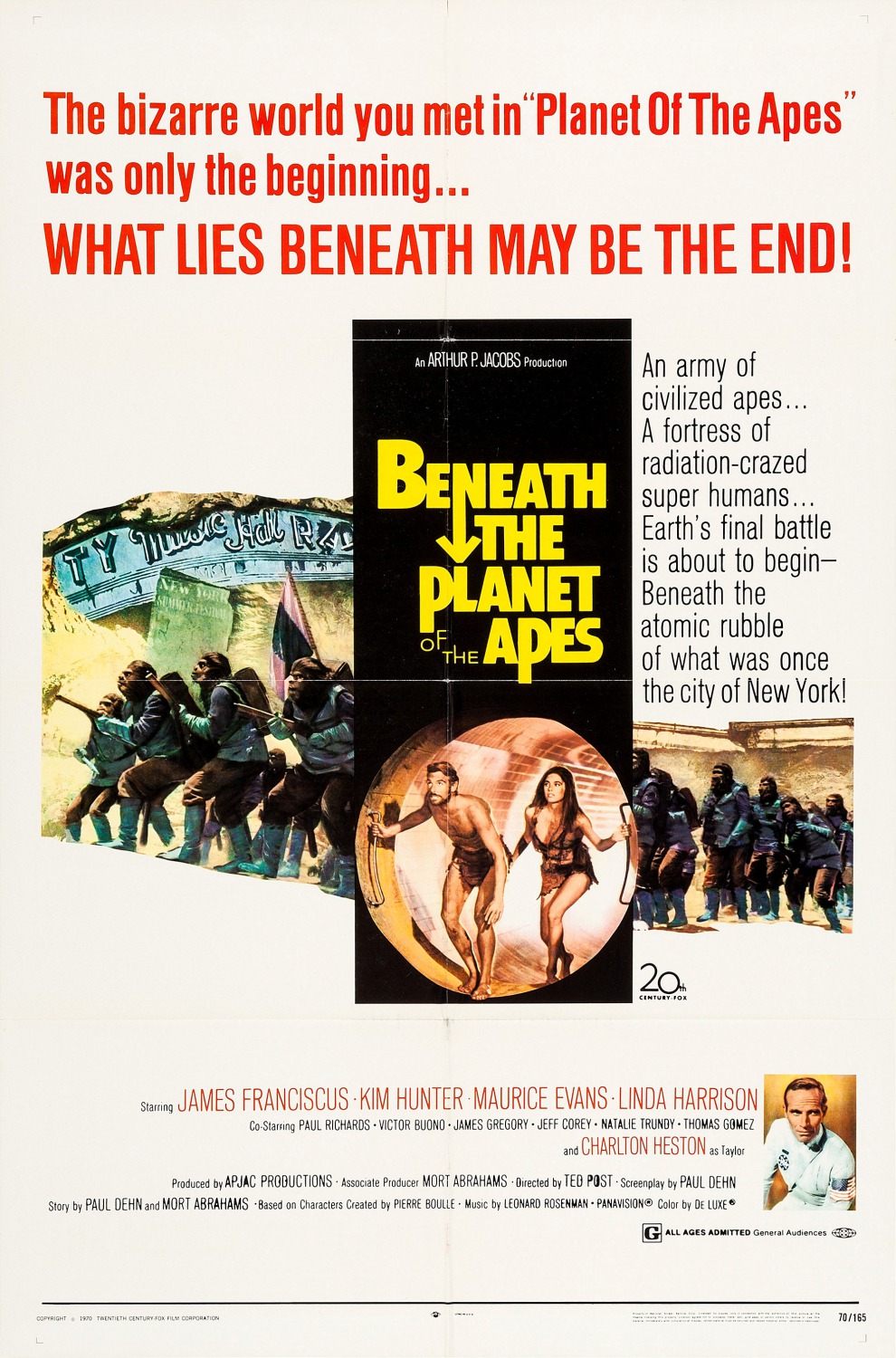






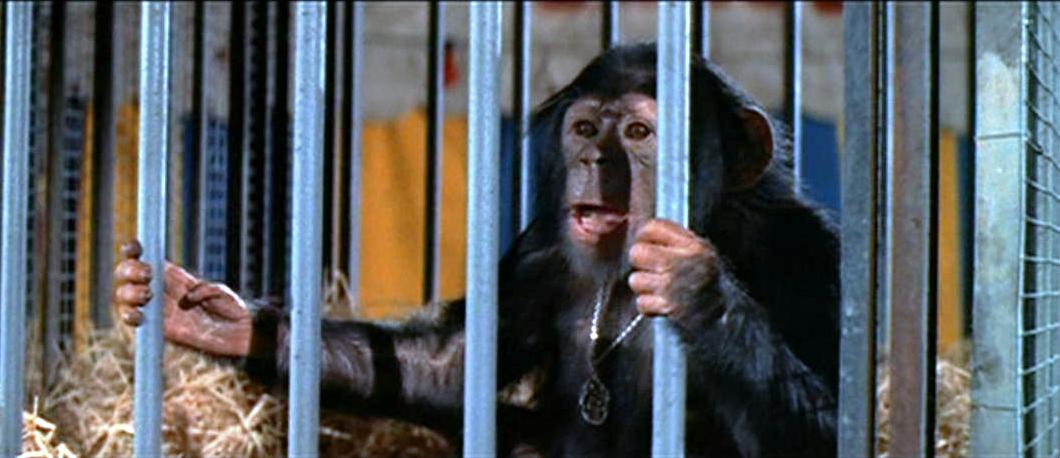
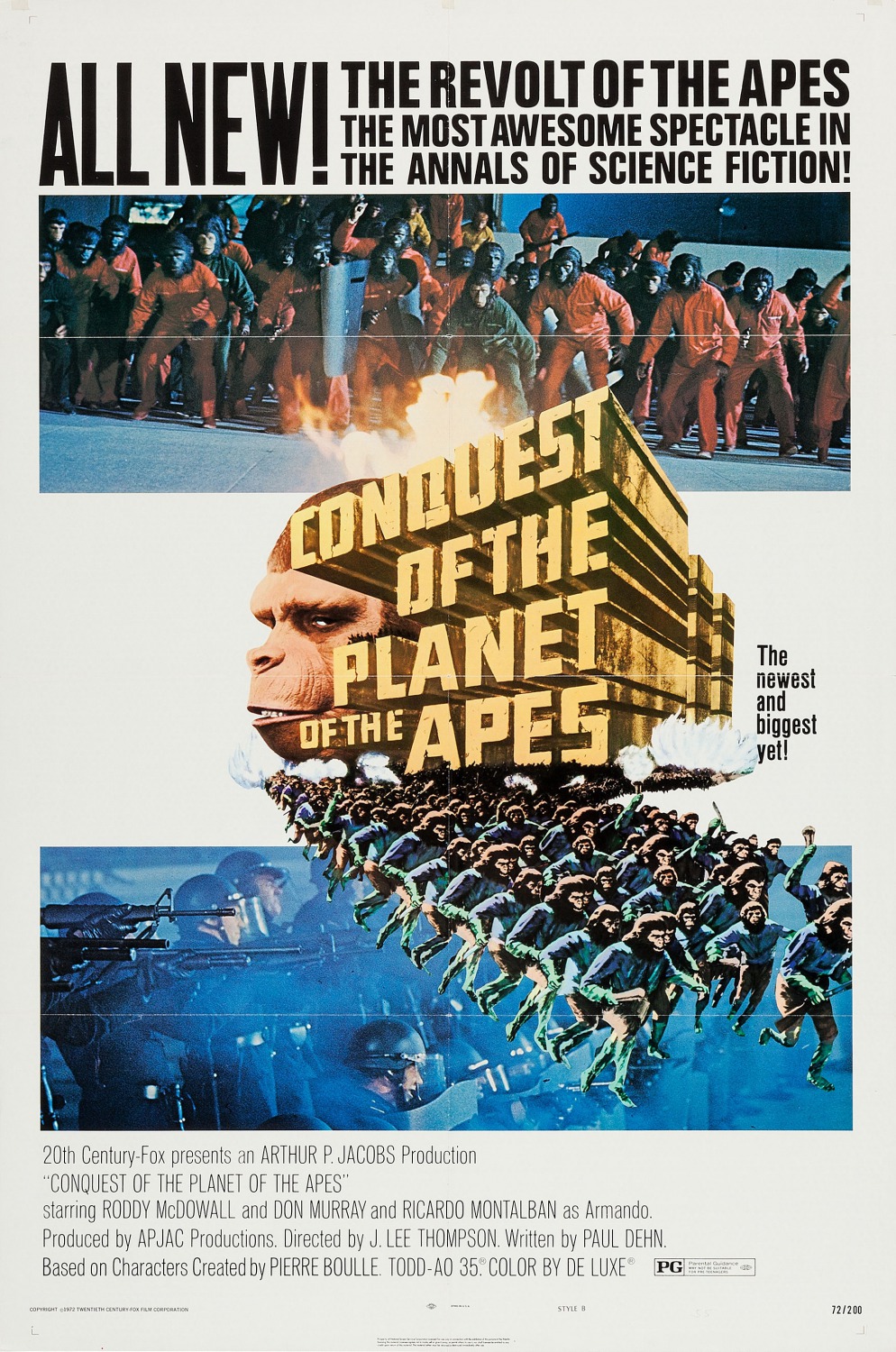
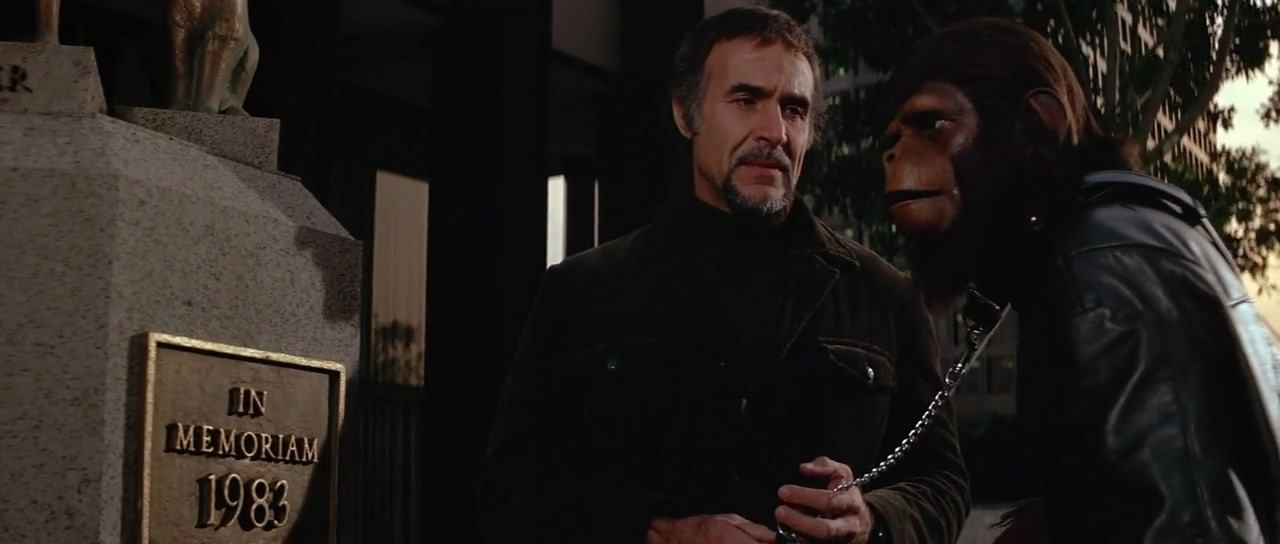

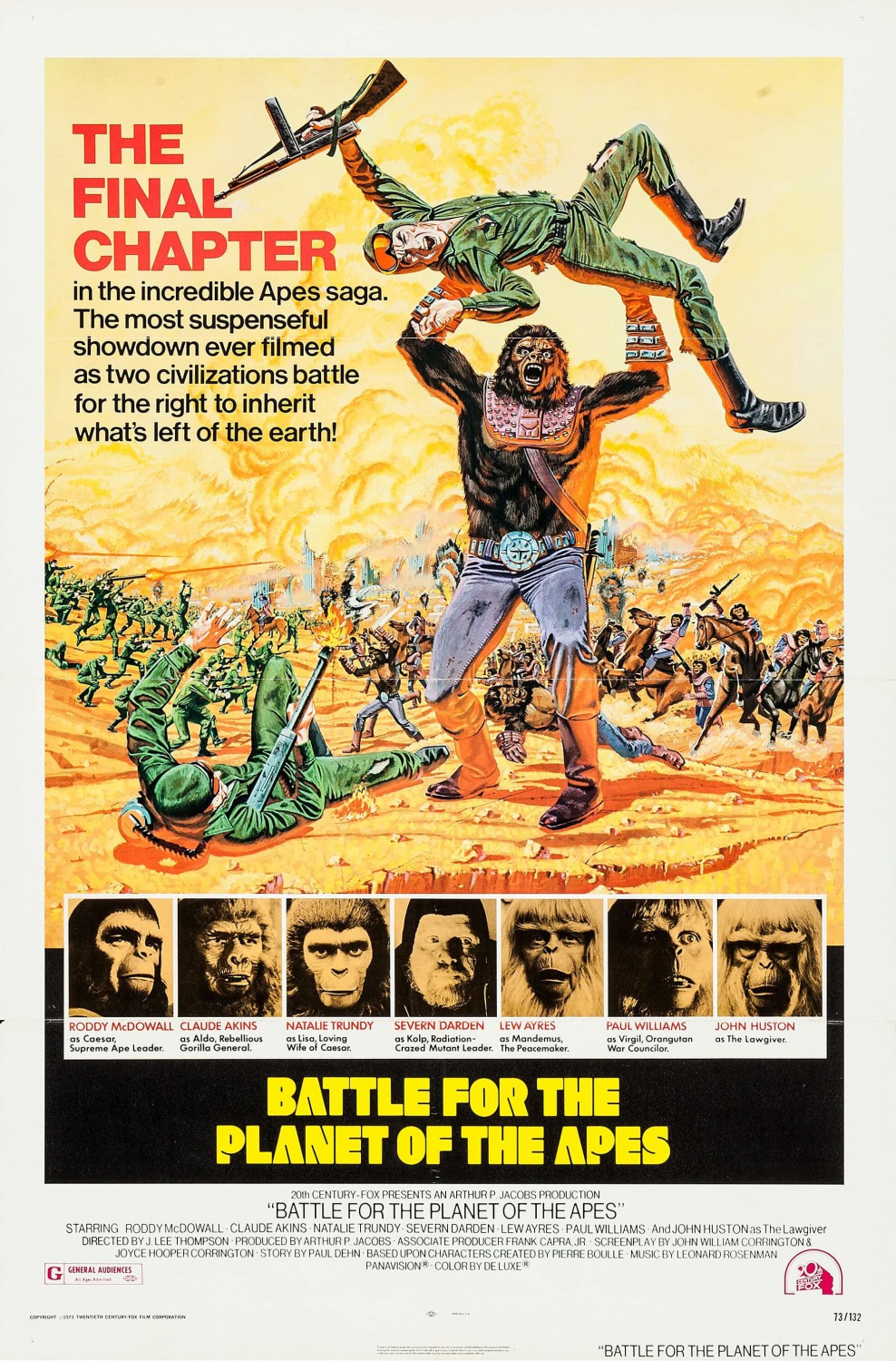
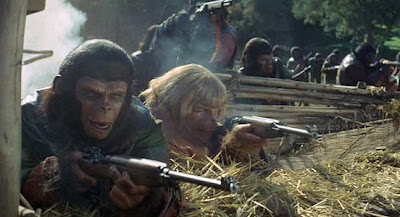
No comments:
Post a Comment